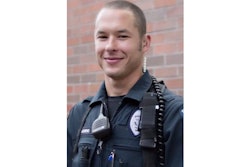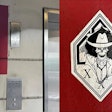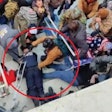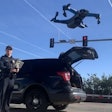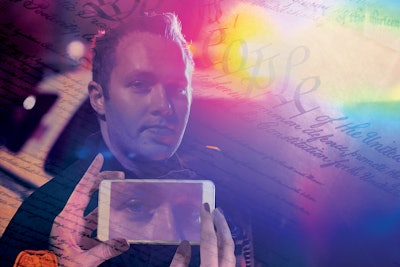 Photo Illustration: Kevin Haegele, POLICE Art Director
Photo Illustration: Kevin Haegele, POLICE Art Director
You have probably watched some of the first generation of videos that popped up on social media sites and on YouTube showing officers dealing with people using smartphones to film them. In these videos, the officers would often order the people filming them to stop, and/or they would awkwardly try to cover their faces with one hand, all the while telling the subjects doing the filming, "I haven't given you permission to record me."
It took a while but over a period of years such videos have pretty much dried up. This is because those of us working in the field have become increasingly accustomed to being filmed while on traffic stops or being filmed from public sidewalks or adjoining yards while responding to a call. We were also educated by decision after decision from federal appeals courts recognizing that filming the police in public is constitutionally protected activity under the First Amendment. So far, all six of the 12 U.S. Circuit Courts of Appeals to have squarely confronted the issue—the First, Third, Fifth, Seventh, Ninth, and Eleventh Circuits—have ruled the right to film police officers in public exists.
The First Amendment guarantees, in addition to freedom of speech, free exercise of religion, and freedom of the press. In its 2017 decision in Fields v. City of Philadelphia upholding the public's right to film the police, the U.S. Third Circuit stated that the right "goes beyond protection of the press," as the First Amendment also "protects the public's right of access to information about their officials' public activities."
Today, some of the same people who started out filming police at traffic stops and during other public operations are now bringing their cameras to our police facilities. They are recording the exteriors, and sometimes the interiors, of police buildings and other municipal infrastructure. They are standing on public sidewalks next to the driveways where officers come and go in their personal vehicles, filming faces and license plates. Some will argue the people behind the cameras—who call themselves "First Amendment auditors"—are simply testing the resolve of the police to respect their right to film "whatever they can see from a public space." Others will argue these auditors are deliberately "baiting" officers, trying to provoke them into overreaction. In reality, it's usually a little of both.
The number of active auditors, many with their own YouTube channels, is steadily increasing. Over the past two years auditors have broadened their professional network to where the more seasoned auditors fly around the country helping fledgling auditors get started. How do they pay for these trips? How do beginner auditors afford to take off time from work to pursue this new hobby? The answer is GoFundMe and other crowd funding accounts where viewers and followers make donations. The more successful auditors have banners on their social media channels urging viewers to donate and "Help keep Joe Auditor on the road!" Usually visible during any livestream broadcast is the scrolling list of fans literally from around the world, thanking the auditor for the entertaining content, with comments like, "Hey, it's Sean from Down Under. I can only afford $30 U.S. this month, but I should be able to double that next time. Keep up the good work!" Think about it. If an auditor has a thousand or so active followers who donate even occasionally, the auditor no longer needs a day job.
Unfortunately, American law enforcement is responding to the auditor movement very inconsistently, often out of confusion and a misunderstanding of the governing law. So here are seven things you should know about First Amendment audits and the people behind the cameras.
1. They Misinterpret the Law
Unlike Sovereign Citizens, the average auditor drives a car bearing government-issued license plates, and acknowledges the rule of law. However, the average auditor misinterprets some of this law. For example, Terry v. Ohio requires that an officer possess "specific and articulable facts" providing "reasonable suspicion" of criminal activity before detaining someone. Many auditors have been taught this means an officer must verbally "articulate" the basis for the stop or detention at the outset. That is not the law, although many agencies do require an officer making a traffic stop to start the contact by introducing himself and explaining the reason for the stop.
2. They Refuse to Self-Identify
YouTube has plenty of content with the following scenario:
Officer: "So what are you trying to film?"
Auditor: "Anything I can see from public areas. You can't trespass my eyes."
Officer: "Can I see your ID?"
Auditor: "No you may not. I have committed no crime, and I am engaged in constitutionally protected legal activity."
Officer: "What's your name?"
Auditor: "I'm not giving it and I'm not answering any more of your questions.
This scenario underscores an officer's need to understand the difference between the right to ask for ID, and the ability to criminally punish someone for refusing to give it. In Hiibel v. Sixth Judicial Court of Nevada, the U.S. Supreme Court ruled that refusal to identify is a crime only where: 1) there is a valid detention; and 2) there is a state statute making refusal to identify a crime. Nevada had such a law, and that is why the Supreme Court rejected Mr. Hiibel's claim his arrest for refusal to identify was unconstitutional. But just next door, in California, there is no such statute, and the U.S. Ninth Circuit has declared that California Penal Code § 148—which is the state's resist/delay/obstruct statute—cannot be used to charge someone who refuses to identify during the time they are detained but not yet arrested.
These state-specific laws are often referred to as "stop-and-identify" statutes, and in many YouTube videos, it appears the auditors know them better than the police. Google the phrase "stop and identify states," and multiple maps will appear color coding the states having such laws.
3. Popular Targets for Auditors
Initially, auditors stood outside our police facilities and filmed people coming and going until being contacted and challenged. As more and more agencies realized the auditors just want attention, and that perhaps the best response is no response, auditors started looking elsewhere for targets.
So the auditors started taking their cameras to other government buildings. Federal buildings have become very popular targets, and whenever a federal employee or security guard calls 911 to report the activity, local city or county law enforcement responds. This is a problem because the average police officer or deputy sheriff does not know about the 2010 and 2018 Department of Homeland Security memos directing federal law enforcement not to detain persons filming their facilities absent some other indicator of criminal activity. The 2018 DHS memo now covers the interior of federal buildings, and officers responding to calls of filming inside post offices are getting schooled on this point by auditors. The policy is even detailed in U.S. Postal Service Poster 7, which prominently appears in post office lobbies. Unfortunately, many USPS workers behind the public counter are unfamiliar with this policy.
Not wanting to appear hostile to the First Amendment, even some police agencies are now instructing their officers to allow filming inside police station lobbies. As stated in an October 2018 directive by one major southern California agency, "Members of the public . . . have a First Amendment right to . . . record video in any public place where they are lawfully present. . . . . The types of places an individual has a legal right to be present include . . . a Sheriff's station lobby . . . ."
While well-intentioned, this kind of instruction swings the proverbial pendulum too far in the other direction.
If an auditor wants to enter the police department lobby and film the trophy case from the Police Olympics, or the display case of the Explorer Post's camping trip, no problem.
But what if the auditor enters while crime victims are interacting with detectives at the front counter, or a domestic violence victim appears sobbing for help on what has been the worst day of her life? Do we really mean to tell our officers the auditor's "right" to film supersedes the rights of these other people to privacy and decorum? If we do, we have completely lost sight of the fact that at least two federal appeals courts, prior to the advent of smartphones and First Amendment audits, ruled that the lobbies of government buildings, including a police station, were not "public forums" for purposes of First Amendment protection.
4. Auditors and Bad Words
In 1974, in the case of Lewis v. City of New Orleans, the U.S. Supreme Court declared unconstitutional a city ordinance that made it a crime to curse at the police. When the attorney for the City argued that the ordinance could still punish the use of "fighting words," the Court expressed doubt, because police officers are "trained to exercise a higher degree of restraint than the average citizen." Translation: What might constitute "fighting words" when directed from civilian to civilian, may not qualify as such when directed from civilian to a law enforcement officer.
Indeed, on March 13, 2019, the U.S. Sixth Circuit reaffirmed in the case of Cruise-Gulyas v. Minard that flipping off the police cannot justify a traffic stop. Yet, we still see uploaded videos showing officers threatening and, in some cases, even arresting a person for exercising their right to be an idiot by publicly cursing at an officer.
What about an auditor displaying a poster stating, "F__ City Hall" on a public sidewalk? A longtime auditor out of Florida did that very thing outside the Moultrie, GA, city hall on July 3, 2019. He was first approached by the city manager, who said he did not appreciate the vulgar language. In response, the auditor very politely agreed it was vulgar and said he was simply exercising his First Amendment right "to be critical of the government on the day before Independence Day." Around this time, Moultrie police officers appeared and placed the auditor under arrest for "disorderly conduct." Since our basic training academies spend little time—if any—on First Amendment rights, these officers likely never heard about the U.S. Supreme Court's 1971 decision in Cohen v. California, which established a First Amendment protected right to be critical of the government or its programs through the public use of profanity. It came as no surprise only a few days later that Moultrie's chief of police had the criminal charge dropped.
5. Their Favorite Question
"Am I being detained or am I free to go?"
It sounds like a simple question. And it should have a simple answer. Yet, there are lots of posted videos where an officer, who is visibly frustrated by an auditor's refusal to identify, gets hit with this question and becomes even more frustrated and confounded.
In one such video, a deputy sheriff in Monmouth, NJ, is attempting to identify a woman filming the exterior of a federal building. Every time the woman asks if she is being detained, the deputy asks for ID. When the deputy finally tells the woman she is not being detained, she immediately turns around and walks off. At this point the deputy still wants to know who she is, so he catches up to her and detains her farther down the sidewalk. This indecision would likely not play well to a jury, especially since, as we've discussed, it is not illegal to film the exterior of a federal building.
6. How Close is Too Close?
How close does the First Amendment allow the auditor holding a smartphone to get to your traffic stop or your arrest? That is still an answer waiting to come from our nation's appellate courts. Yet, in one video from 2018, a San Diego Sheriff's Office motor deputy politely asks two auditors who walk up on his traffic stop to move just a little farther down the sidewalk. The male auditor retorts, "Hasn't the Supreme Court said that 10 feet is the correct distance?" The deputy, visibly puzzled, has no comeback. That may be because the Supreme Court has never said that 10 feet is the correct distance. It has never specified a "correct distance."
7. You Might Get Sued
For years it appeared that most auditors were only interested in fame and the adoration of their online followers. Since the auditors were funded by their followers' contributions, there was no added incentive to take on the police in litigation. That has now changed with reports of officers being sued in federal court for nothing more than a Terry stop predicated upon public filming that the officer deemed "suspicious."
Officers need to remember that, under Terry, a detention is lawful under the Fourth Amendment only where behavior gives rise to "reasonable suspicion" that "criminal activity may be afoot." Terry does not authorize detention where behavior is only "suspicious." Behavior that is merely suspicious because it is unusual, may certainly be grounds for a "consensual encounter" by law enforcement, but more than that is constitutionally required to lawfully detain someone against their will. Most auditors are trained on where to stand and what to say such that it is probably the exception where their behavior provides articulable evidence of "criminal" activity.
But where auditors do file litigation and are successful, what are the payouts? In 2018, a Colorado Springs auditor received a $41,000 settlement after being detained for refusing to identify when officers observed him filming their police facility.
Also in 2018, the City of Manchester, NH, agreed to pay a settlement of $275,000 to a man who was arrested for recording his conversation with officers, without their consent, while speaking to them at his home over an animal complaint.
Do not lose sight of the fact that civil rights attorneys are being attracted to these cases for two reasons: 1) "low-hanging fruit," i.e., usually clearly unlawful detentions, all caught on video, with officers sometimes making gratuitous comments out of frustration they almost instantly regret; and 2) attorneys' fees. There have been countless civil rights cases over the years where the attorneys' fees awarded to plaintiffs' counsel under 42 U.S.C. § 1988 far exceeded what the client received by way of jury verdict or settlement.
Final Thoughts
The number of First Amendment audits and new auditors is increasing, not decreasing. It behooves all agencies to train their officers about the goals of these auditors, the tactics they use, and, most importantly, the legal principles under the First and Fourth Amendments by which the officers' response will be measured in court should litigation be filed.
Scott MacLatchie is a Charlotte-based attorney who created the "Dangerous Crossroads" class, which teaches officers how to deal with people with cameras trying to bait them into overreaction. He defends law enforcement agencies in litigation and serves as a reserve deputy with the Los Angeles County Sheriff's Department.




